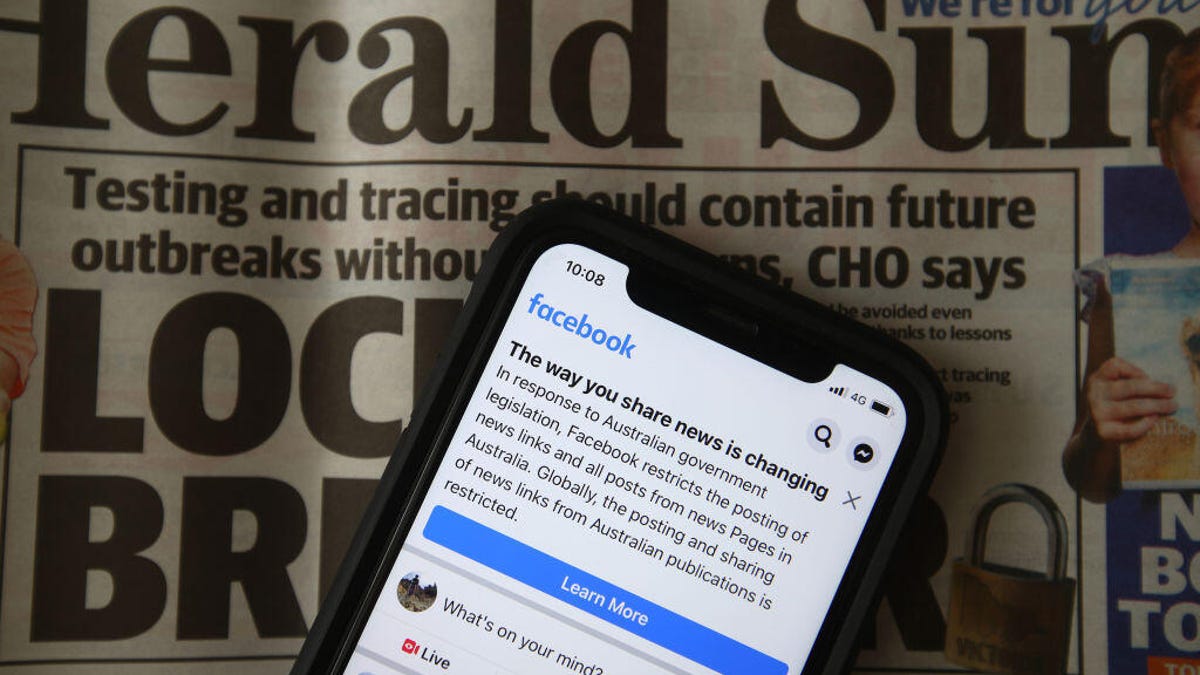Facebook VP defends company's actions in Australia news spat
In a blog post, Nick Clegg explains that while Facebook's actions might have seemed "abrupt," they were actually a long time coming.

Facebook and Australia have come to an agreement.
Facebook's vice president of global affairs, Nick Clegg, published a blog post on Wednesday defending the social network's actions in its standoff with the Australian government, which caused the social media platform to temporarily block news in the country. That action, Clegg says, might have felt "abrupt and dramatic" if you hadn't been following the story closely.
Facebook suspended news last week in response to an Australian bill that would force the company to pay publishers for the news content that surfaces on its platform. Following concessions from the Australian government that mean Facebook will instead be allowed to support small and local publishers of its own choosing, news was restored to the social media platform on Tuesday.
It could be a harbinger of fights yet to come between Facebook and government regulators. Politicians in the EU, the UK and Canada, concerned about the social network's power, have said they're following the developments carefully.
Clegg wrote that the suspension didn't come out of the blue: Facebook had indicated it might have to pull news from Australia six months ago, and negotiations with the Australian government had been going on for three years. He added that he believes the situation was caused by a "a fundamental misunderstanding of the relationship between Facebook and news publishers."
"The assertions -- repeated widely in recent days -- that Facebook steals or takes original journalism for its own benefit always were and remain false," he said. Clegg went on to describe how Facebook views its relationship with news publishers and the actions it's taken to support them.
News publishers likely have a different perspective on how this relationship operates and serves them. This relationship has been evolving as Facebook has grown and news has shifted online, and both Facebook and publishers have made perceived missteps in the eyes of the other along the way.
On Tuesday, Josh Frydenberg, Australia's treasurer and communications minister, reiterated the government's position regarding the bill, known as the News Media Bargaining Code: "Australia has led the way globally in seeing public interest journalism protected," he tweeted. "Our news media code is all about levelling the playing field & ensuring digital giants pay news media businesses for generating original content."
The Australian government didn't immediately respond to a request for additional comment.
Clegg said Facebook took issue with the proposed Australian law because it would have forced the company "to pay potentially unlimited amounts of money to multi-national media conglomerates," without any guarantee that the money would be used to support journalism or smaller publishers. "It's like forcing car makers to fund radio stations because people might listen to them in the car -- and letting the stations set the price," he said.
He admitted that the company "erred on the side of over-enforcement," causing some non-news content -- for instance, weather reports and government health posts -- to be inadvertently blocked.
Clegg wrapped up his post by saying that it's fair to want to hold big tech companies accountable and work toward a sustainable model for journalism, but that regulation needs to be based on a true understanding of "how value is derived from news online" -- something that once again, publishers and Facebook might not necessarily fully agree on.
"The internet needs new rules that work for everyone, not just for big media corporations," said Clegg. "New rules only work if they benefit more people, not protect the interests of a few."

